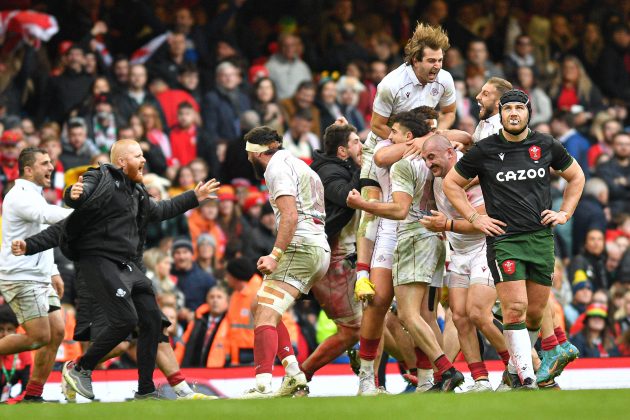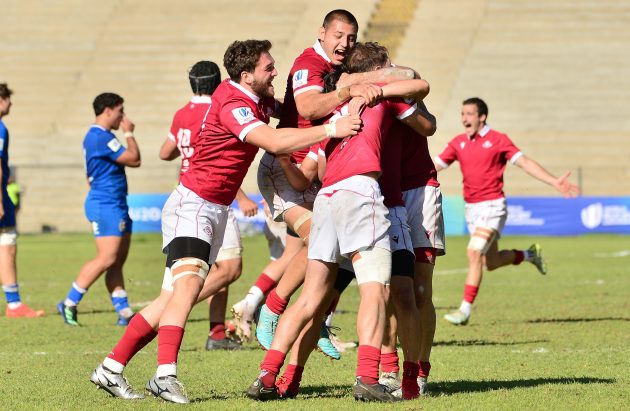The Lelos boss wants opportunities for his nation's 'Golden Generation'
With a month to go until the Rugby World Cup kicks off, excitement is building towards fever pitch. The 20 squads are playing their crucial warm up games and the organisers in France are putting the finishing touches to the ultimate global celebration of the game we all love.
As seems to repeat on a four yearly cycle, there’s intense focus on the prospects of the resurgent All Blacks, our lavishly skilled French hosts and serial RWC underachievers Ireland – who arrive as World No1 and all-conquering Six Nations Grand Slam winners.
But amid all the eager anticipation and meticulous preparation, hugely important questions about the future of the game are swirling around. That’s because an announcement is expected that could be as significant as anything that happens on the pitch.
The governing bodies of the Six Nations and SANZAAR are poised to unveil a new world league that would radically overhaul the international fixture list. It would mean the Six Nations sides and the four Southern Hemisphere giants – plus Japan and Fiji – competing against each other bi-annually from 2026.
This exciting new venture is designed to increase competition, expand rugby’s appeal and commercial impact across the planet and inspire future generations. All great intentions, but for very good reasons there are increasingly loud rumblings of controversy and concern.
The criticism in media columns and on social forums is that the plan is in danger of reinforcing the closed shop approach of the elite nations and frustrating countries like mine that are hammering on the door of Tier One.
As coach of Georgia, I’m 100% focused on the World Cup and preparing the best squad we’ve ever assembled to reach a peak in France. After our victories over Wales and Italy I have every confidence in my players and in our strategy. We’re heading into the tournament determined to make a real impact.
World Cups offer a brilliant showcase to grow the game globally – which quite rightly is World Rugby’s primary mission. The new competition could do the same but according to reports organisers won’t bring in promotion and relegation until 2032. That would mean almost no chance of most of my current squad ever having the opportunity to take part however well they perform and whoever we beat.

A special day in Cardiff, after winning 13-12 (Getty Images)
More importantly than that it will also put a giant roadblock in the path of a younger generation of Georgian rugby players who are achieving amazing results at U20 level.
The Georgian rugby U20s made the rugby world sit up by defeating England three months ago. Then in the recent World Championships, they beat Italy and Argentina and only lost to South Africa by the narrowest of margins – missing out on a semi-final place through a technical quirk of the tournament rules.
This golden generation of young players finished in an unprecedented eighth place – firmly amongst the elite tier. They placed higher than Argentina, Italy, Japan and Fiji – yet the young players from all of these nations (plus Scotland who didn’t even qualify for the championships) will be automatically involved in the new international competition from which Georgia is excluded.
Does that seem fair? Is it meritocratic? What message does that send to aspiring young players in Spain, Portugal, USA, Samoa and other growth nations? How will it help to grow the game and inspire future generations?
My fear is it’ll do the opposite and the sense that there are insurmountable barriers to progress on merit will turn young players away from the game. I worry that they’ll see the door firmly closed and focus instead on club rugby – probably in France or Japan – or turn to other sports. The golden generation will become a lost generation and the consequences for the future of the game as an open, diverse global phenomenon, could be grave.
Our U20s performances against Tier One opponents have been described by our rugby president Soso Tkemaladze as a “glimpse of the future”. Yet having pitted themselves against the world’s best, and more than held their own, what lies ahead looks like injustice, frustration and demotivation.
If we want to make the game really attractive to future generations, we have to show that that there’s a real chance of meritocratic upward mobility. Perform well against the elite – indeed beat quite a few of them – and expect to be rewarded with the chance to continue developing your game and set an example to those coming next.
If the door of the new competition is going to stay shut for another nine years there is an alternative solution that could go a long way to ensuring the future of the game for the younger generation. That lies with the compelling annual contest that is the U20s Six Nations.

France and England U20s (Getty Images)
We’re not seeking to replace anyone – just the right to compete against England, France, Ireland, Scotland, Wales and Italy on merit every year in an expanded competition. That would keep the young players motivated, inspire other ambitious nations and could pave the way for change at senior level. And it could happen within a year or two rather than waiting until 2032.
There are encouraging signs that this kind of visionary approach is in the minds of officials running the game. Georgian rugby has already been invited to play in the Six Nations festival at U18 level and are looking to be the host nation in two years’ time. The U20s should be next, then the sky is the limit.
For the good of the game we love, let’s encourage aspiration don’t crush it. Incentivise winning don’t devalue it. Inspire the next generation don’t frustrate them. Invest in the future, don’t cling to the past…
What do you make of the future for Georgian rugby? Let us know on rugbyworldletters@futurenet.com or via social media.
Download the digital edition of Rugby World straight to your tablet or subscribe to the print edition to get the magazine delivered to your door.
Follow Rugby World on Facebook, Instagram and Twitter.





